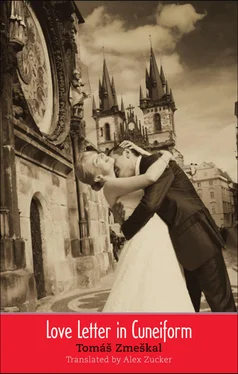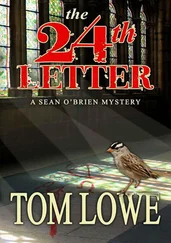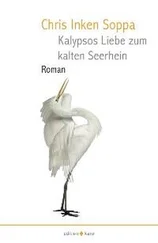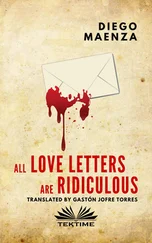“Why should I be afraid of you?” the pastry chef had replied. “We are all brothers in suffering, you the thief, me the pastry chef. The sun shines on all alike.”
“But the sun isn’t shining now. It’s nighttime,” the thief managed to say.
“You’re right there, brother,” the pastry chef said. “It’s nighttime in my soul, too.” Pausing a moment, he added: “Help yourself, brother. Take whatever you need, or whatever you think you need.” Then he just asked the thief to leave the radio in the living room, since listening to the misfortunes of the world helped him concentrate. And he needed to concentrate to be able to do his work. So the thief took some money and a few small items, but he was still nervous, seeing that nothing like this had ever happened to him before. He decided the pastry chef must be a wacko, so he’d just take what he came for and get lost. That’s what he should have done, he should have hit him over the head and made a run for it. Then he wouldn’t be lying here in the hospital with his leg broken in two places and all these other problems.
“What other problems?” the policeman asked.
“That’s just it,” the thief replied.
Before he left, he took all the money that was there, but as he was walking down to the ground floor he had a feeling there was something wrong about the whole thing, so he decided to go back and take another look around. He tried the door to the kitchen, the one room he hadn’t been in yet, opening it as quietly as he could, but the pastry chef heard the hinges squeak and, back turned toward the door, bent over the table, where he was busy working on something, he said to the thief, “Come in, brother. Come into my workshop, where the vanity of the world is echoed and reflected. Come into my shell, my sanctuary. Come in, let me embrace you before your departure.”
The thief had no idea what the pastry chef was talking about or why he wanted to hug him, and he definitely didn’t know why he was calling the kitchen a workshop and a shell.
“I think I’ll go now,” he said, scanning the room with the quick, precise, experienced gaze of a thief. At first he thought he didn’t fully grasp what he was seeing. There were human body parts spread all over the kitchen. Hands, feet, breasts … As he opened his mouth to gasp for breath, the pastry chef slowly turned toward him, still sitting in his chair, holding a woman’s head in his hand.
“This used to be my wife, brother,” he said. “She isn’t here anymore, so I have to re-create her. That way at least the memory of her will still remain. You see?” As the thief suddenly realized what was going on, the pastry chef stood from the chair, the woman’s head in his hand, and started walking toward him. Oh my God! the thief screamed in his head. Oh my God! No! He wanted to run but couldn’t move, as if his heel, his Achilles tendon, had sprouted roots that were anchoring him to the ground. He couldn’t take his eyes off the ghastly sight of the kitchen morgue.
Until finally, when the pastry chef was almost right on top of him, he screamed: “Stop where you are, dammit! Not one step closer!”
“Why not, dear brother?” the pastry chef asked. The thief couldn’t even think anymore. Edging backward as the pastry chef came closer, he suddenly spun around and ran through the nearest door, spotting a window that overlooked the garden, a way out of that gloomy apartment of horrors. Imagining he could feel the pastry chef’s breath on his neck, although in reality it was just his hairs standing up in fright, he shielded his head with his hands and leaped out the window, shattering the glass, flying … down.
A fierce pain in his leg brought him back to consciousness. For a moment the pain yanked his instinct for self-preservation out of the drawer of his consciousness. But then his fear of the madman returned and the thief realized he was now in the garden, bordered by a wall at least six feet high, at a great disadvantage, with his unworthy life about to come to an end. He realized that he should repent. Being a nonbeliever, an atheist, he didn’t know the word penance , but my God, he now knew its measure. As best he could — atheistically, unbelievingly, hopelessly — ending his wretched, accursed, unhappy life with some semblance of prayer or godless appeal for the resurrection of his soul. He remembered a movie about a revolution he had seen recently in which the condemned men were executed by a firing squad. Arms thrown wide, singing a song, racked by bullets. He was sure a terrible death awaited him, maybe torture, which was why his soul now had to prepare, it was the only thing certain, there was no doubt in his mind. He had no weapon, and the moment he tried to stand, the pain was so great he nearly lost consciousness. So he slowly, gradually, crawled over to the wall, where at least he couldn’t be seen. He had to drag his leg behind him, making an effort not to cry out in pain. He tried but he knew that his wheezing resounded in every direction. He wouldn’t be anywhere in sight when that monster came to do to him what he had done to his wife! He had to be prepared, he knew it. He didn’t know exactly how, but he knew he had to be ready.
The officer who had overheard the thief’s confession was both dismayed and pleased. It was horrible, sure, but it could also mean a substantial bonus, or maybe … just maybe … even a promotion. He got up from the chair, mindlessly ordered the thief not to leave the room, and went out to the hallway. There he grabbed the hand of the first nurse who walked by, pulled her into the room, instructed her to stay there and keep an eye on the injured man, and notified his commanding officer by telephone.
Another police car pulled up to the building, and the officers energetically leaped out. They surrounded the house and garden and secured all the openings through which the suspect might escape. In contrast to the original squad’s investigation of a disturbance of the peace, the mood was completely different now. The deputy chief of the precinct was also present, having already woken the chief, his immediate superior, who had instructed him to secure the area, detain the suspect or suspects, and file a report with the Criminal Investigation Department afterward. Time marched onward before that could happen. In an hour it would start getting light. The police found the address they were looking for, turned off their safeties, one covering the other, and quietly stepped into the side entrance of the pastry shop. Quietly they searched it, two members of the squad remaining on the ground floor while the rest of the team crept up the stairs. The door was locked. After a moment of uneasiness they decided to force it open. On the second attempt they were successful. Several policemen rushed in and flashlights shining and pistols in hand proceeded to search the apartment. The apartment was quiet. All of the rooms were quiet, except in the living room, where a voice on the radio was discussing the nuances of international politics. After a moment’s hesitation the policeman standing nearest the receiver switched it off. The house and its occupants were still asleep. The doors had been either fully or partially open in all the rooms they had searched so far. The only room with the door closed, a wafer-thin light emanating from under the threshold, was the kitchen. Two officers, safeties off, took up positions on either side of the door. The first policeman, who stood on the right, opened the door and the two policemen from the left rushed into the room, shouting, “Hands up and nothing will happen to you!” In an instant the pastry chef was flat on the ground. His hands were twisted behind his back and he was put in handcuffs. Nobody else was in the room. As the police led him away to the squad car, which drove him straight to the police station, the officers charged with securing the building until the CSI arrived began searching through everything they found in the kitchen. The thief was right: There was a woman’s head on the kitchen table. A pair of breasts rested on top of the refrigerator, and part of the sole of a foot was on a small shelf over the stove. But when they turned on the lights, they got a surprise. They looked at each other, stunned. “Can you believe it, guys?” one of them said. “It’s all made out of marzipan.”
Читать дальше












